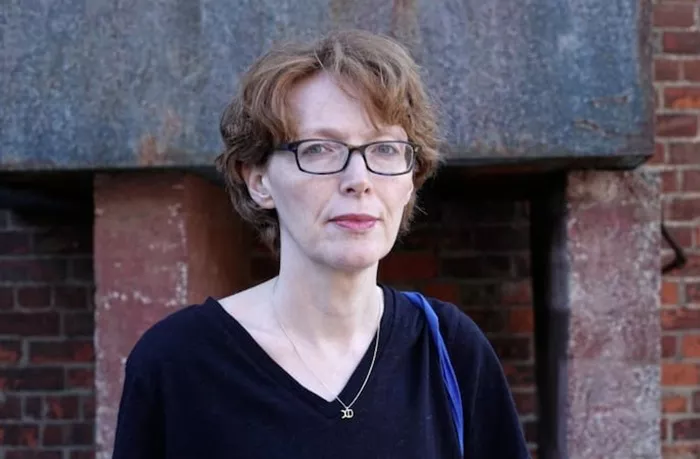Belfast author and playwright Rosemary Jenkinson has become a familiar face in Ukraine, making five visits to the war-torn country since the outbreak of conflict. Her personal experiences and observations there have not only fueled her advocacy for Ukraine but also served as inspiration for her first novel, The Memorisers, which imagines a dystopian Belfast under strict state control.
Jenkinson’s involvement with Ukraine began in June 2022, when she first traveled to the country to gain a deeper understanding of its situation, beyond the headlines and news reports. Her visit was inspired by her literary heroes, such as Ernest Hemingway and Susan Sontag, who, during the Bosnian war in 1993, made their own journeys to conflict zones. Jenkinson’s initial goal was clear: “As a writer, it seems very important to see exactly what is happening in the world,” she said.
During her time in Ukraine, Jenkinson found herself amidst the destruction, dodging explosions, and witnessing firsthand the resilience of Ukrainians. “I was walking down the road in Kherson, trundling my little wheelie case behind me. It was ridiculous, but I thought afterwards how the Russians were probably able to see me from across the river and say, ‘Look at this idiot,’” she reflected. Yet, despite the ongoing threat of violence, she felt the solidarity and bravery of the Ukrainian people.
The impact of her experiences continued to resonate with her, and by September 2022, Jenkinson found herself transforming these vivid memories into her novel, The Memorisers (Arlen House). The book explores a future Belfast, devastated by nuclear war and under constant Sino-Russian attack. In this bleak world, language and memories are controlled by the state, and individuals are punished for dissent.
The Memorisers introduces Jo Eliot, a war correspondent who awakens in a hospital after a drone attack, only to find she has lost her memory of the very story she was covering. Set in 2067, the novel imagines a city in which history is erased, and free speech is severely restricted. The book explores themes of individualism and the enduring power of memory, even when a totalitarian regime tries to erase it. The story also weaves in a romantic element, as Jo meets soldier Scott, whose love for her proves that the heart remains untouchable, even in the most desperate of times.
Jenkinson admitted that the novel, though set in a dystopian future, reflects current fears. “It does alarm me that nuclear war could actually happen. We have been seeing the threat of it and hearing mention of it on the news a lot recently,” she said. “When I came home from my second visit to Ukraine, I was haunted by the images of destruction, soldiers, refugees – it all made me think, what if that was in Belfast?”
The personal connection to her work extends beyond her travels. Jenkinson’s own brush with censorship in Ireland further influenced The Memorisers. A few years ago, she wrote a piece for a magazine titled The Troubles with Northern Irish Literature, criticizing what she saw as an overemphasis on the legacy of the Troubles in contemporary writing. Her publishers, she claims, subsequently “pulled the plug” on a novel she had written, leading her to reflect on the dangers of free speech suppression. “It made me think how, if you express your thoughts, you’re ‘out.’ That is really frightening,” she said.
While the unpublished novel remains in a drawer, Jenkinson channeled her frustration into The Memorisers, which deals with themes of censorship and the struggle for individual expression. “The lead character, Jo Eliot, does not bow down to being silenced,” Jenkinson explained. “Her quest not to be muzzled is really what the book is about.”
Jenkinson has returned to Ukraine twice since 2023, with plans for another trip this summer. Her firsthand experiences in the war zone have shaped both her writing and her worldview, and she remains deeply committed to supporting the Ukrainian people. She continues to be an outspoken advocate for free speech, human rights, and the resilience of the human spirit.
In her view, The Memorisers is ultimately about hope: “The novel is about the human individual, and the triumph of that individual, despite everything,” she said. “Even in the darkest times, you need heroes.”
With her unique blend of contemporary and dystopian fiction, Jenkinson is also embracing her evolving role as a writer: “I’m a sunny-sided pessimist,” she said with a smile. “A modernist, and now a futurist as well.”

